Controversy sparked on social media over the weekend after Filipino American comic creator Joshua Luna took to Twitter on Friday to talk about his new graphic novel, AMERICANIZASIAN. At the start of his Twitter thread, he writes, “For #APAHM I’d hoped to announce the release date of AMERICANIZASIAN, a book collecting my online comic strips about Filipino American & Asian American identity & experiences.” Then, he adds, “but since my publisher @ImageComics doesn’t seem comfortable publishing it, I need your help.”
Thread: For #APAHM I'd hoped to announce the release date of AMERICANIZASIAN, a book collecting my online comic strips about Filipino American & Asian American identity & experiences, but since my publisher @ImageComics doesn't seem comfortable publishing it, I need your help. 1/ pic.twitter.com/OWh8jyRbY4
— Joshua Luna (@Joshua_Luna) May 31, 2019
Luna goes onto describe the process of pitching this graphic novel to Image Comics, where he has published several graphic novels including The Sword, Girls and Ultra. According to his tweets, when he initially pitched AMERICANIZASIAN in April, a partner at Image said it was too negative and that it wouldn’t sell if no one could relate to it. Luna says this partner, a white man, asked at least one Asian-American staff member at the publisher to back up his claims; eventually, the book was “begrudgingly” greenlit. Then Luna submitted the cover, and he was told it couldn’t be used to legal concerns over his riffs on copyrighted characters.
From there, Luna says, he attempted to seek feedback for changes to make the book work for publication, only to be rebuffed by the publisher and their legal counsel. Given Image’s controversial history of defending offensive material from its creators, Luna says the publisher is discriminating against him and his work.
Yet when a marginalized person speaks truth to power, speaks about the harm of anti-Asian narratives, it's condemned as unpublishable for being "angry" & "negative?" Suddenly Image's credo of publishing comics "no other publisher would dare take a risk on" no longer applies? 12/
— Joshua Luna (@Joshua_Luna) May 31, 2019
Since Friday, Luna’s thread has sparked conversation throughout the industry. Former Image publisher Erik Larsen tweeted, “The only partner involved with approving Image central books is Eric Stephenson and crying racism and taking to twitter is a classless move and absolutely unfounded.”
When reached via e-mail by The Beat, a spokesperson for Image Comics said the publisher has no comment on Luna’s claims. (However, Image had earlier submitted and then withdrawn a response to other media outlets.)
In addition to reaching out to Image Comics for comment, The Beat reached out to Luna via e-mail to discuss AMERICANIZASIAN, his tweets, why he opened up about the situation on Twitter, and how he plans to move forward.
Samantha Puc: Can you describe the content of AMERICANIZASIAN?
Joshua Luna: AMERICANIZASIAN is an original graphic novel that collects my online comic strips exploring Filipino American and Asian American identity through fictional and non-fictional situations based on my observations, struggles, and experiences, particularly from my point of view as a comic creator. The book also includes new, never-before-seen content that tie all the strips into an overall narrative, documenting my journey of self-actualization and self-love as I learn to dissect and embrace my Filipino/Asian identity after a lifetime of being taught to do the opposite.
Puc: Do you think the content of this book differs from other politically-minded comics that hit shelves lately?
Luna: From what I’ve seen, my book is a little unusual because it blends the genres of autobiographical memoir, political cartoons, and comic books. Each strip tackles a complex and difficult topic about the Asian American experience and condenses it onto a single page, and I can’t say I’ve seen that done before.
What’s also unusual is my audience. Since my background is in the comic book world, these strips were originally geared toward comic book readers. But over time, I’ve been surprised to be approached by so many educators who’ve told me they share my comics with their students and greatly enjoy the engaging discussions that result. So I think AMERICANIZASIAN can act as a bridge between the comic book and academic world, which is exciting. It’s like halo-halo—many disparate layers of ingredients blended together into one delicious treat.
Puc: When did you first pitch AMERICANIZASIAN to Image and what was the initial response?
Luna: I pitched AMERICANIZASIAN to an Image partner in the beginning of April, and the first response was… silence. I actually had to follow up to get an answer, and this became a reoccurring theme throughout our exchange. His answer was what I documented in the Twitter thread. As the discussion progressed, I had to repeatedly explain why this book had an audience, a story, and a positive tone and purpose. No matter what I said, it seemed the partner wanted to reject the book altogether and make me start over from scratch, but somehow make it my decision instead of his.
Puc: How was the response to this book different from the response to your previous work?
Luna: Very different, and I even said so in my conversation with the partner. Ever since I published my first book with Image, Ultra, in 2004, Image has promptly and enthusiastically greenlit my books. After Girls and The Sword, it got to a point where the partner explicitly stated that he didn’t even need to see sample pages for my pitches because I’m not new and he’s familiar with my work. When I pitched AMERICANIZASIAN, I provided samples anyway—since the content and format was different than what I had previously done—but he still needed more. Nothing I said or showed him ever seemed enough.
It’s worth noting that Ultra, whose protagonist is a Latina superheroine named Pearl Penalosa, explored the idolatry of celebrity by parodying superheroes. In 2019 this might seem blasé, but in 2004 it was borderline sacrilegious, particularly for a debut comic author. Not only did Image not push back, they loved it.
So when it comes to parodying superheroes, I guess you could say I’m just returning to my roots—only this time, with a Filipino American protagonist.
Puc: When were you told your work would be removed from digital platforms? Were you given a reason for why?
Luna: As I mentioned in my thread, two days after a heated exchange with the Image partner about AMERICANIZASIAN, I was notified that my bestselling series would be burned. Burning books is normal to reduce storage costs, but this notice was unusual in several ways. First, it was an automated email with no person attached, it was labeled “time sensitive” with burning scheduled to take place within 2 weeks, and it was set to happen whether I agreed to it or not. Also, for the first time, it said that after the books were destroyed, Image would remove the series from ComiXology, effectively ending digital sales of the series and my royalties.
When I asked Image [about it], I was told that the notice was just unfortunate timing and part of an ongoing process that had nothing to do with our separate conversation about my current project.
[Note: According to several reports, the notice Luna received was a form letter sent to several creators.]
Puc: What made you decide to open up about this on Twitter?
Luna: Being labeled as “angry” and “negative” so many times was very isolating, especially when both the cover and the book as a whole have been a source of joy and catharsis for me, and have helped me build an incredible community of supportive fans. I waited 30 years to talk about these thoughts and experiences, and it felt like I was being asked to retreat back into silence. The constant pushback over the course of two months made my world feel small.
But when I realized Image was not being forthcoming in moving my project forward (even after I promptly and thoroughly provided them a list of strips that may pose a legal problem) and the conversations were becoming increasingly contentious, I knew my career was already in jeopardy whether I stayed silent or chose to speak up. My options were dwindling.
Ultimately, I knew I couldn’t get help if I didn’t ask for it. I just had to believe that the community of people who’ve enjoyed my strips would be there for me, and they were. The outpouring of support over the past few days has been overwhelming. Image has been my home since 2004, but maybe I’d found a new kind of home without even realizing it.
Puc: What are you hoping for in a resolution to this issue?
Luna: Within hours of going public with what happened, I received an email from the partner describing my post as slander, libel and outright lying. So honestly, the first thing I’m hoping for is to not get sued for speaking truthfully about how I was mistreated.
The next thing I want is to not get blacklisted. I think comics and the media industry as a whole has been dragging its feet in acknowledging the history and severity of anti-Asian narratives and imagery, to the point where it’d rather kill the messenger than acknowledge the message.
I also don’t want to be discarded so that later on someone else who’s “less angry” gets the opportunity to tell my story, especially if that person has white heritage. That’d only add insult to injury.
Overall, what I want is what I’ve wanted from the start: searching for a home to publish AMERICANIZASIAN so that I can tell my story in my own words.
Puc: Do you have plans to publish AMERICANIZASIAN solo or through another company?
Luna: I have no firm plans yet, but I promised my fans long ago to get this book into their hands, and I’m still determined to make that happen. In the meantime, I’d really appreciate support through Patreon or donations through PayPal. I want to thank everyone who’s pledged or donated so that I can continue creating and making these comic strips. Your support means so much to me.
Puc: Is there anything else you’d like to add?
Luna: It’s important to remember why these difficult conversations are so necessary. Anti-Asian content brings harm to Asian Americans in real life, such as bullying, poor mental health, and even violent domestic and foreign policy. And because positive Asian American media is so rare (especially for Southeast Asians, as East Asian representation is often the default for what little we’re given), many Asian Americans are forced to absorb this hate in silence and internalize it to the point of believing that it’s true. This leads to many Asian Americans erasing ourselves, even in our own stories, and that’s exactly what AMERICANIZASIAN seeks to examine and undo.
But I’m trying to get this book made in an industry where the first most likely Asian superhero protagonist we’ll see on the big screen is the son of one of the worst Asian caricatures in history, Fu Manchu. An industry where a white writer pretended to be Japanese for years, taking opportunities away from actual Asian writers, and was promoted to Editor-in-Chief anyway. An industry that has a deeply hurtful, deeply embedded anti-Asian problem both on the page and off.
The question is, is the industry ready to change? Or is it going to continue to silence Asians for being “angry”?
Luna’s cover for AMERICANIZASIAN is below, as well as preview pages from the collection. Luna notes that each of the strips below were completed before he pitched the book to Image Comics, and that they do not depict anyone specific.


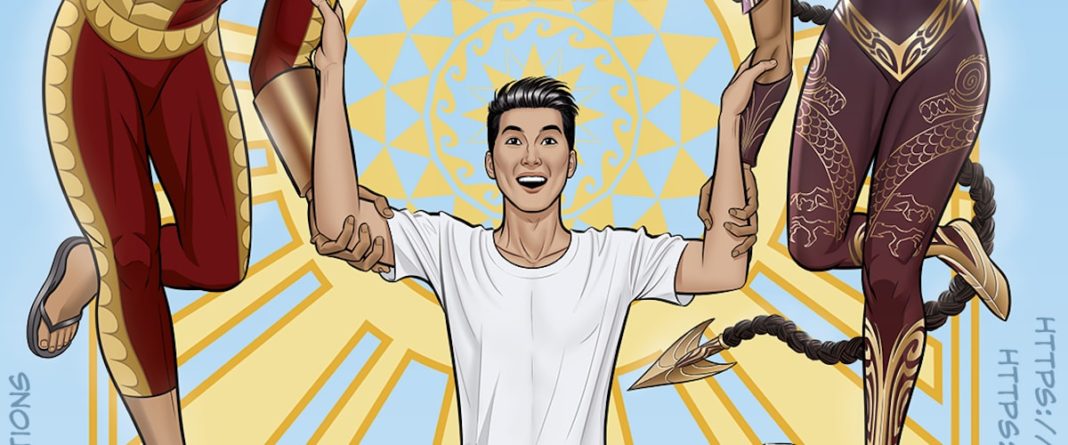
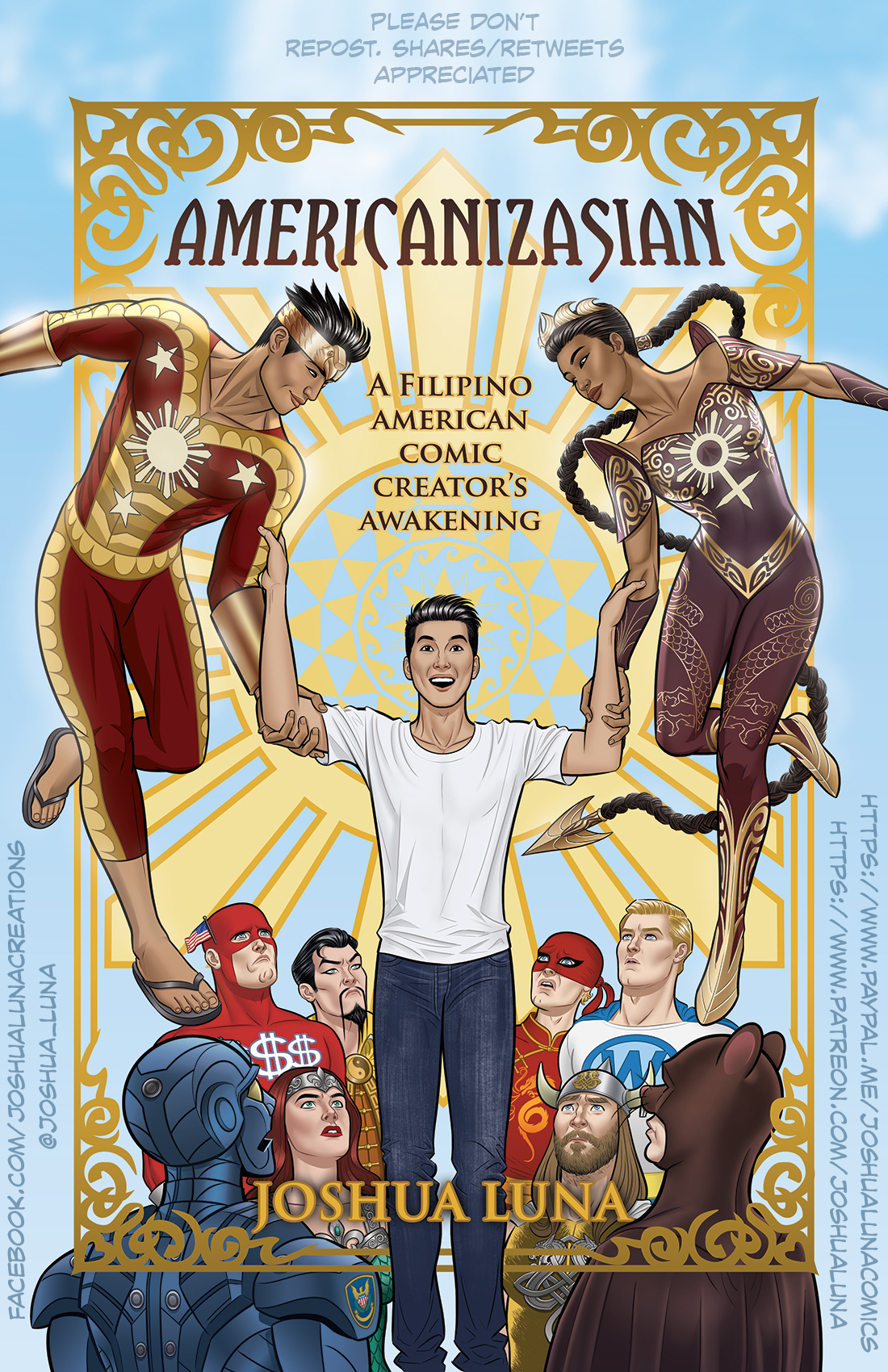

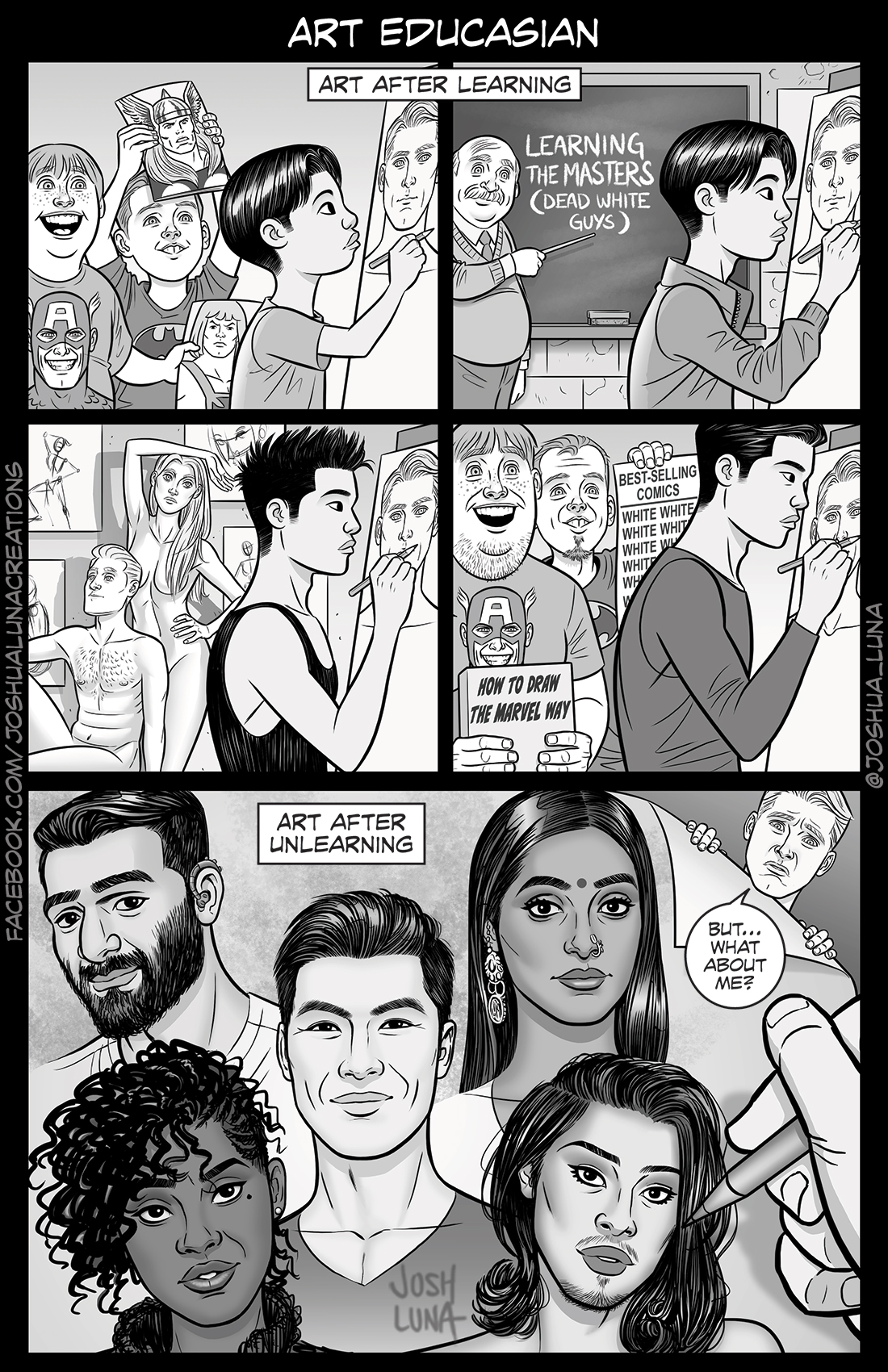
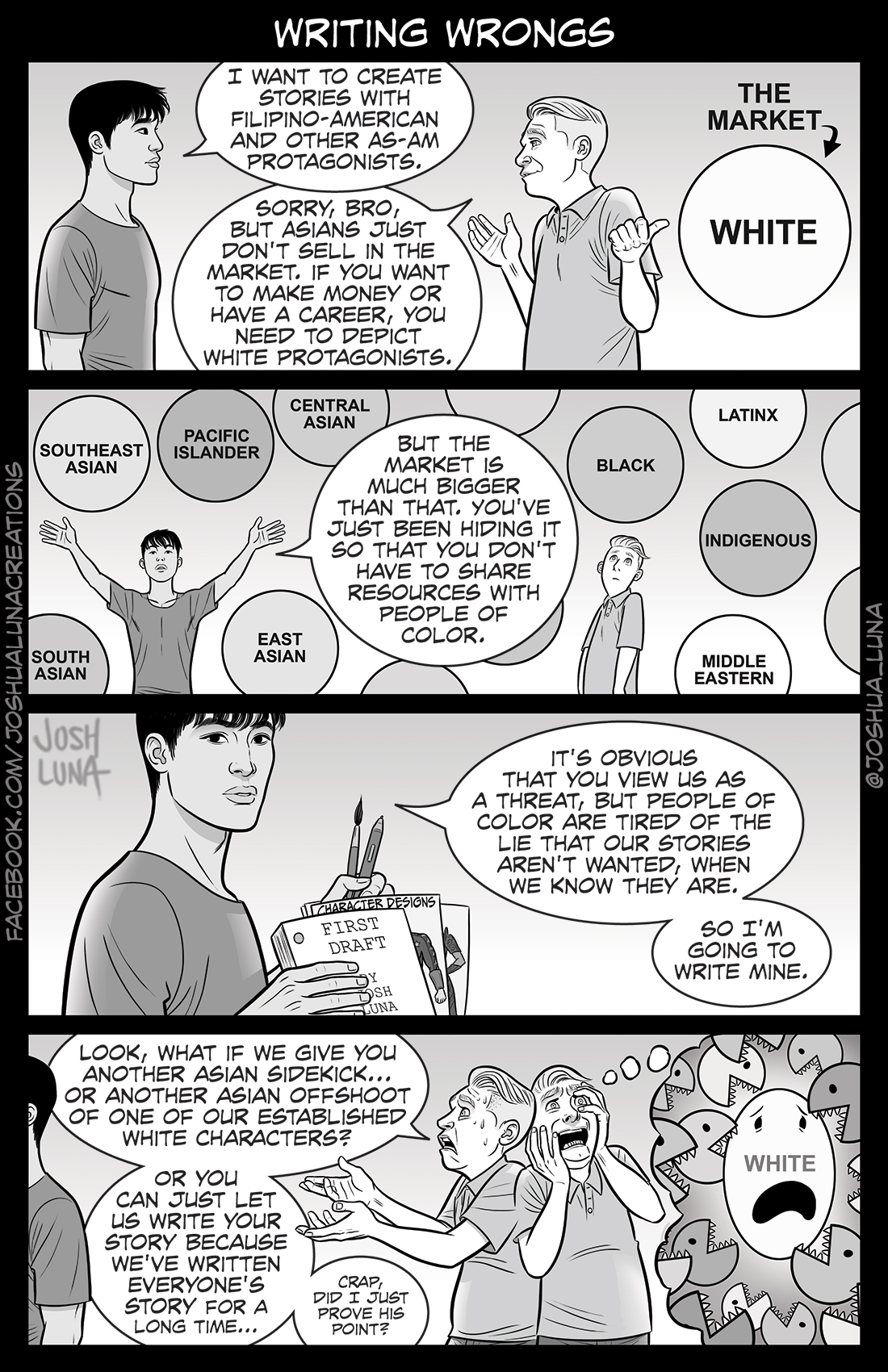
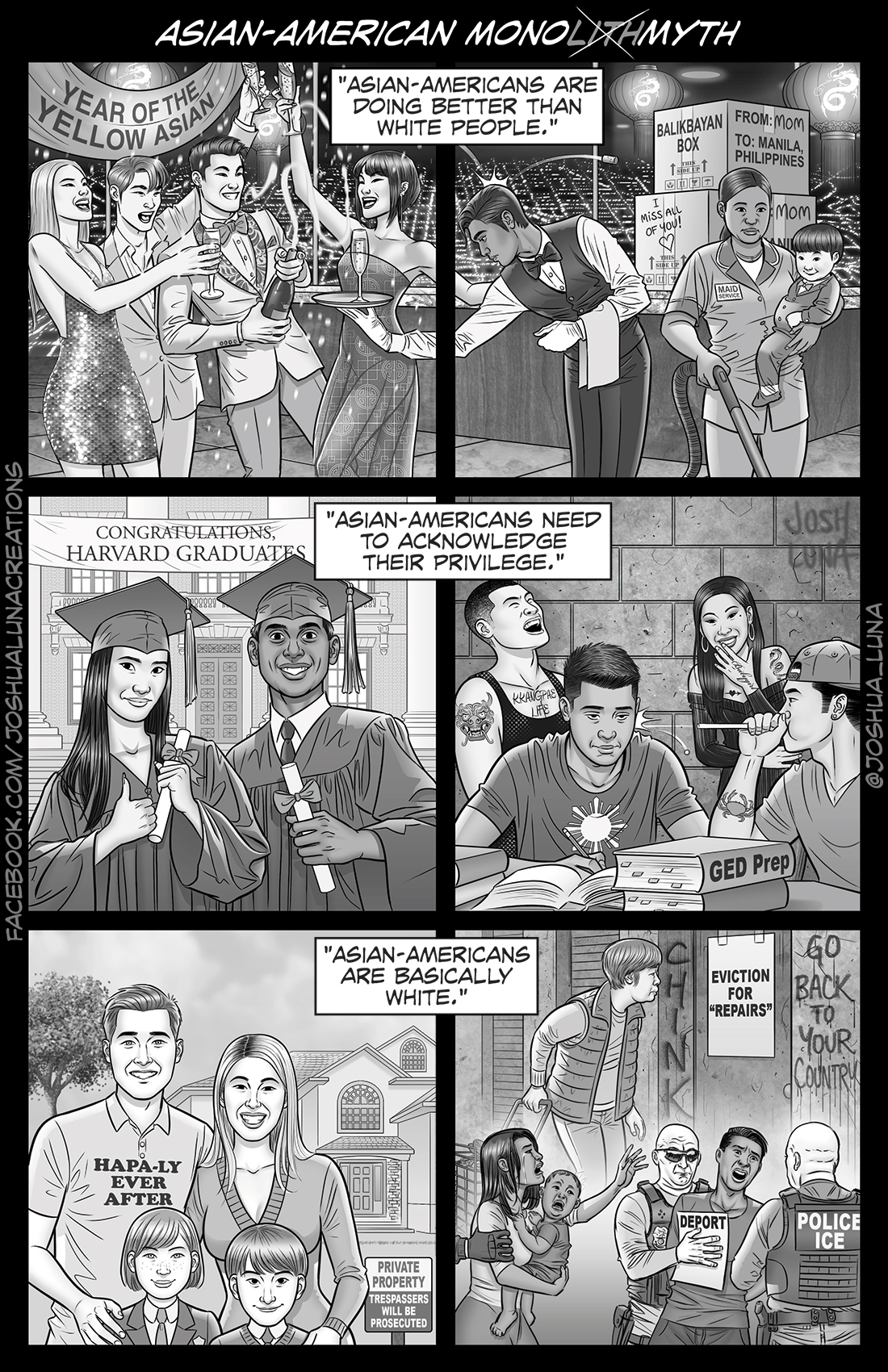
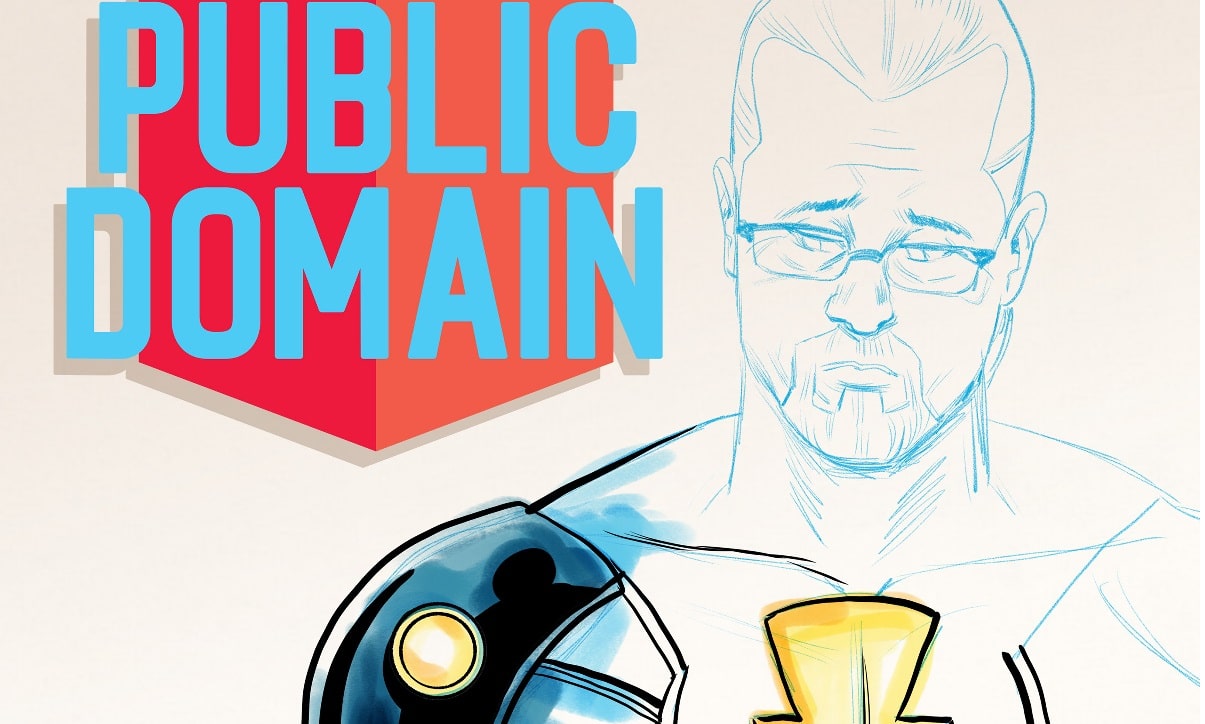
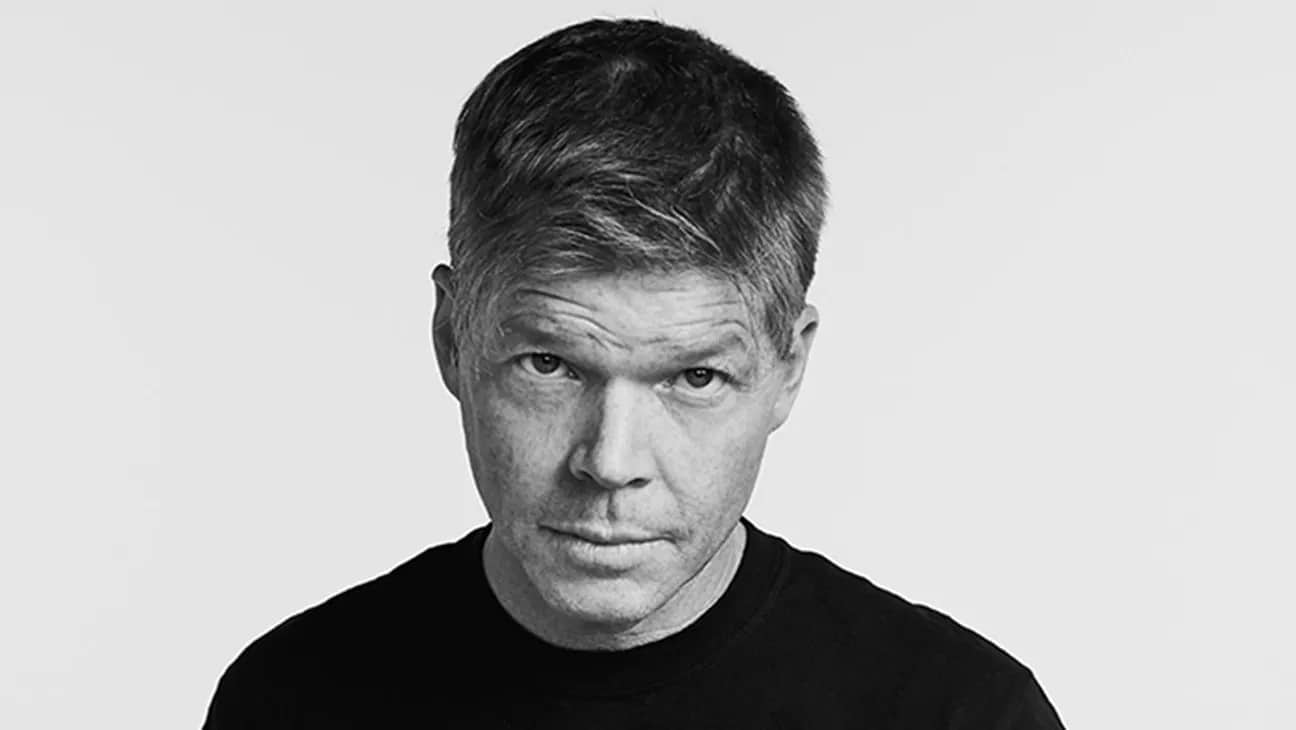
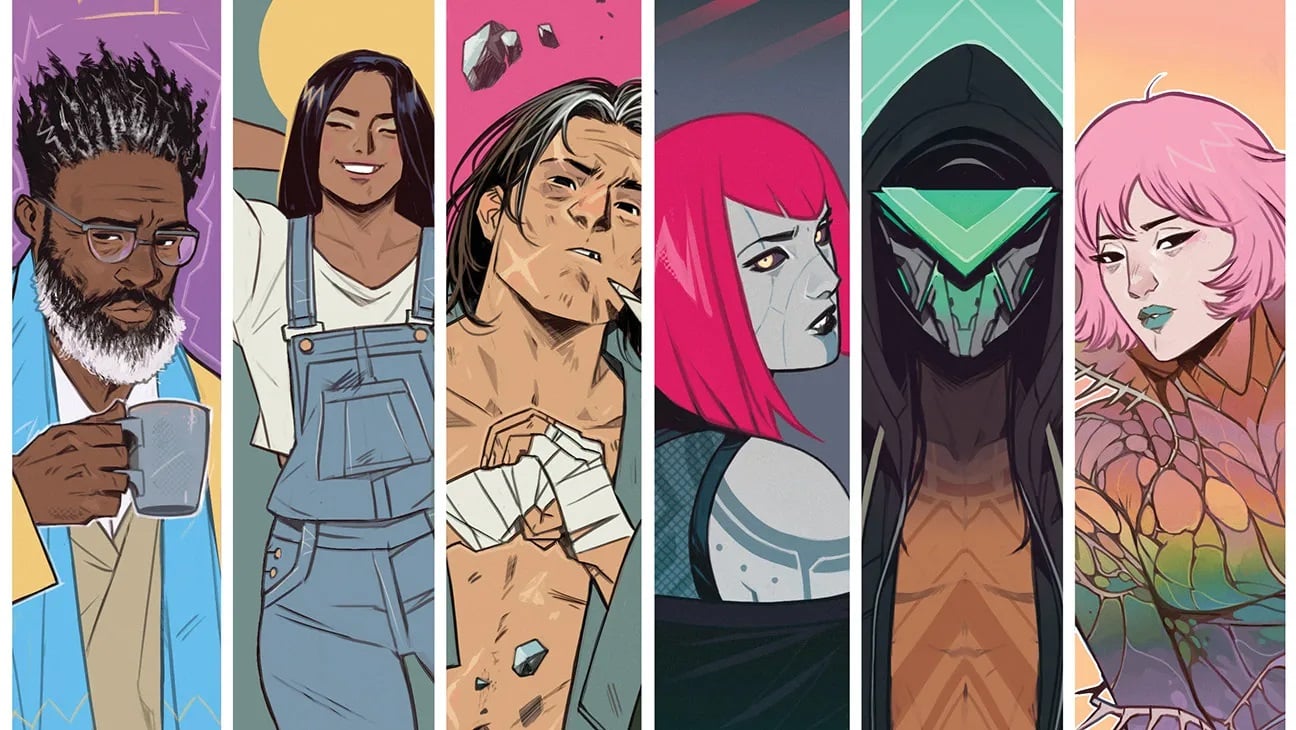


This whole story blows my mind. I can’t understand for the life of me why Image wouldn’t be all over publishing this.
Thanks for including samples of the comic to give some context. It looks great. Image is being foolish.
Why are we asking Larsen for any input on this? His book deteriorated into a bored, horny teenager’s study hall notebook a decade ago, and the handful of his characters that aren’t explicitly or implicitly white are all bad stereotypes. This isn’t “crying racism” – this is calling out Image on double standards and circling the wagons round the usual frat of idiots yet again.
I’m glad to be introduced to this material — I’d definitely read this book — but you really buried the lede, saying (without further verification, it appears) that all of Luna’s previous work would be put out of print (as well as potentially that of other creators in an “ongoing process”). That’s either an uncorroborated claim or the even bigger news here.
Image have confused me here. I would have bought this on the strength of Ultra, Girls, the Sword, and Whispers, all of which I thought were great. And now having seen the gorgeous artwork in this new work, as well as the cleverness of the way the points are made, I know I would have wanted to buy it even if I hadn’t read all those other series.
i’m confused. So once Image publishes a few of your books, they’re obligated to publish whatever you want for the rest of your life? That’s a cool deal. Kind of entitled crying here i think. Maybe Image doesn’t feel it’s right for them at this time. What’s wrong with that?
@stupidactingsmart – I think it was diminishing returns. Each one of those series saw fewer and fewer readers (all of them averaged between 9K and 7K). If I would hazard a guess, warehousing these very niche low-selling titles is starting to put a drain on Image’s coffers. They have not had a clear hit since Paper Girls and are looking to boost their slate with more noteworthy work due to the increasing headcount and costs they have. And in our current landscape, this comic would be lucky to hit those numbers.
I read through the last two years of comics from Mr. Luna since they would be collected in this volume and I don’t see any exceptional work. Good workman comics, but nothing that screams ‘must read.’ Would this have been something that would appeal to a current core audience or one of the growing audiences such as children… probably not. I enjoy socially consciousness work, but the overall cartooning seems rote. These are one page strips with little humor or originality on the subject. And this is a topic that has been done much more deftly by other cartoonists – American Born Chinese by Gene Luen Yang and Sonny Liew’s Art of Charlie Chan Hock Chye come to mind. And I understand that a Filipino perspective is different, but this is billed as addressing ‘anti-Asian narratives’. Both of the two I mentioned are Eisner winning works. There have been a bunch of voices for the past 15 years covering this area and, only in my opinion, done it much better.
But I still think Mr. Luna should publish his work. Enjoyed his Sword and maybe the first few issues of the Girls. He may just be saving the real story or meat of the project for the actual book. There are lots of other publishers who would be super-happy with a 5K print run from a notable comic creator. It just seems like bad form to call a business associate racist since you didn’t like their decision regarding your work (which seems to be what happened here).
I find myself a bit uncomfortable by this story and the people rallying against Image right now. Image is not obligated to publish a work it doesn’t want to publish. It or any company is also not obligated to publish a work even if you feel it has virtuous political ideology. Image or any company is not obligated to even like the work, even if you side with the political ideology of it. Online shaming and bullying a company who didn’t publish your work feels petty and resentful, and extremely unappealing (I wouldn’t want to be a fan of an artist who does this in such a way.) Tens of thousands of comic book writers and artist get turned down all year round (I know many of them.) Many of them are white people, many of them are different races, etc. It’s just how it goes. It’s very difficult to be a successful and published artist. Your work should be exceptional and powerful or hilarious or moving. I don’t see any of that in the samples provided in this article.
What I do see is grievances and complaining and a victim mentality and a strange anti-white sentiment that feels hateful and dishonest and will cause more bitterness and divide. Tell your story of being Asian if it is so interesting, that should be encouraged and celebrated. But causing more tension and divide and racist sentiments and dismissing centuries of influential (and that is an understatement) and beautiful and complex art and literature as “dead white guys” if actually offensive to me (as if an artist would have nothing to learn from these “dead white guys”, some of them absolute geniuses and 100% worth studying in art school, that’s laughable and shockingly ignorant), and it’s absolutely sensible to me that a book publisher would find that distasteful and choose not to give the green light to the book. It’s one thing to prop up your own culture or race, but putting down others to do so? That is immature and hateful.
I’m sure he will get all the support he wants, and judging by the predictable twitter outrage, he already is. But I think this is an incredibly low way to gain publicity for yourself and your career. Produce work of value. Make something hilarious, or breathtakingly original (My Favorite Thing Is Monsters comes to mind as a recent example, well worth the praise and attention it received.) These look like mediocre strips that have a strangely bigoted and dangerous agenda to them. And the comparison to Chaykin is crazy and doesn’t apply here at all (the core messages of his work are anti-racism, etc. The core message in this work is…well, what exactly? To not like art by white people? That’s not the kind of thing Chaykin does so the whining comparison falls flat.)
Take responsibility for not getting published. Don’t put the blame on everyone else. That is a very bad quality to have. I know because I do this too, a lot of people do. But the only way to get through things like this is to not blame others and celebrate your own victimhood, it’s to kick ass and make great stuff and put it out there however you can.
I don’t blame Image for not responding to this.
It’s a rather astonishing pile of absurd accusations.
I’m a bit flabbergasted by the apparent implication that a publisher has some obligation to publish everything a creator produces, just because they’ve published things by him before. It’s discriminatory? Maybe they just don’t believe the book can sell. They’re not obligated to take a financial loss on your behalf. If there is a market for the book, you should have no problem selling it to other publishers. Or that would be the case had you not publicly attacked your current publisher. It’s hard to believe many publishers would want to get in bed with a loose cannon who might accuse them of bias when any disagreement occurs.
Lot of white guys crying because comics is being exposed as racist. I 100% believe Luna in this based on what I’ve seen in corporate management. And it’s the same argument from white guys all over again…”a publisher doesn’t have to publish this, victim mentality, etc.” Tell these same guys Alan Moore should own the Watchmen rights and they’ll cry about contracts and stuff because they want their crappy sequel comics.
I’m sure Image was fine publishing Luna’s book before he went to Twitter and blew up the relationship, despite what he’s attempting to claim.
Image worked like crazy to promote Luna and his brother over the years. Quite successfully. Joshua could pretty much be assured that anything he did would get published, including this book. But that doesn’t excuse him from having his projects examined over justifiable legal concerns, and from being asked to alter things that could throw Image (back) into court.
Throwing a fit over legal concerns, and then inventing scenarios to generate attention and controversy, is a little hard to defend.
One of the most glaring examples is promoting the notion that Image was moving some (and not all) of his books out of stock at Diamond as some sort of retribution. What he received was a FORM LETTER that was sent to many Image creators about the exact same thing.
Image publishes a crazy diverse range of creators. The idea that “discrimination” was involved is absurd.
Chris Hero said:
“Tell these same guys Alan Moore should own the Watchmen rights and they’ll cry about contracts and stuff because they want their crappy sequel comics.”
Well, I’m one of “these same guys” and I think the way DC disrespects Alan Moore is pathetic and terrible. And I’ve never read any Watchmen comic except for Watchmen and I never will, because I believe in artistic integrity.
So oh no, your group stereotype of “white people” doesn’t pan out, now what do you do? Accept that individuals of all races will have various opinions on various subjects, or continue to hate large groups of people to satisfy some backwards and hateful version of social justice?
I also notice you didn’t have so much as an argument against our points as you had baseless random insults and aspersions. Try debating about a complex topic like an adult and see where that gets you.
Image Comics is not obligated to publish this book, and from what I’ve seen they’ve made the right decision to not publish it. I’ve read Ultra, Girls, and The Sword, and if this is the type of behavior I can expect from a creator of those books, I can just as easily stop reading his work. I’ve just about had it with comics people and their behavior.
One of those strips reads and looks just like one of Steve Ditko’s political comics.
Luna seems like a very talented artist who is tackling some important – and difficult – topics. He should expect resistance, so he’s got to handle it all much more maturely. Going to Twitter was a big mistake. Go find a new publisher and when the book comes out explain in an interview or a post why image didn’t publish it, but don’t shoot yourself in the foot first.
Moishe is right – there is a strong resemblance to Steve Ditko’s work in several of these comics. That work was overtly dogmatic, intentionally provocative, and unapologetic – it was also (mostly) published on a shoe-string through Kickstarters with Robin Snyder. I bought it because I’ll by anything by Ditko – not because I agreed with everything by Ditko. Image would probably never publish Ditko’s “Avenging World,” and it’s not surprising they would be hesitant about “Americanizasian.”
Comic book creators are really bad at telling the difference between a business decision and a personal attack. I think it’s a side effect of being a self employed creative for the majority of their adult lives and not fully understanding how the business of art and publishing works.
Looks like something the Jehovah’s Witnesses would give out. Except with race.
Very nice article. Thanks for sharing it :)
Great post. Good job!
Comments are closed.